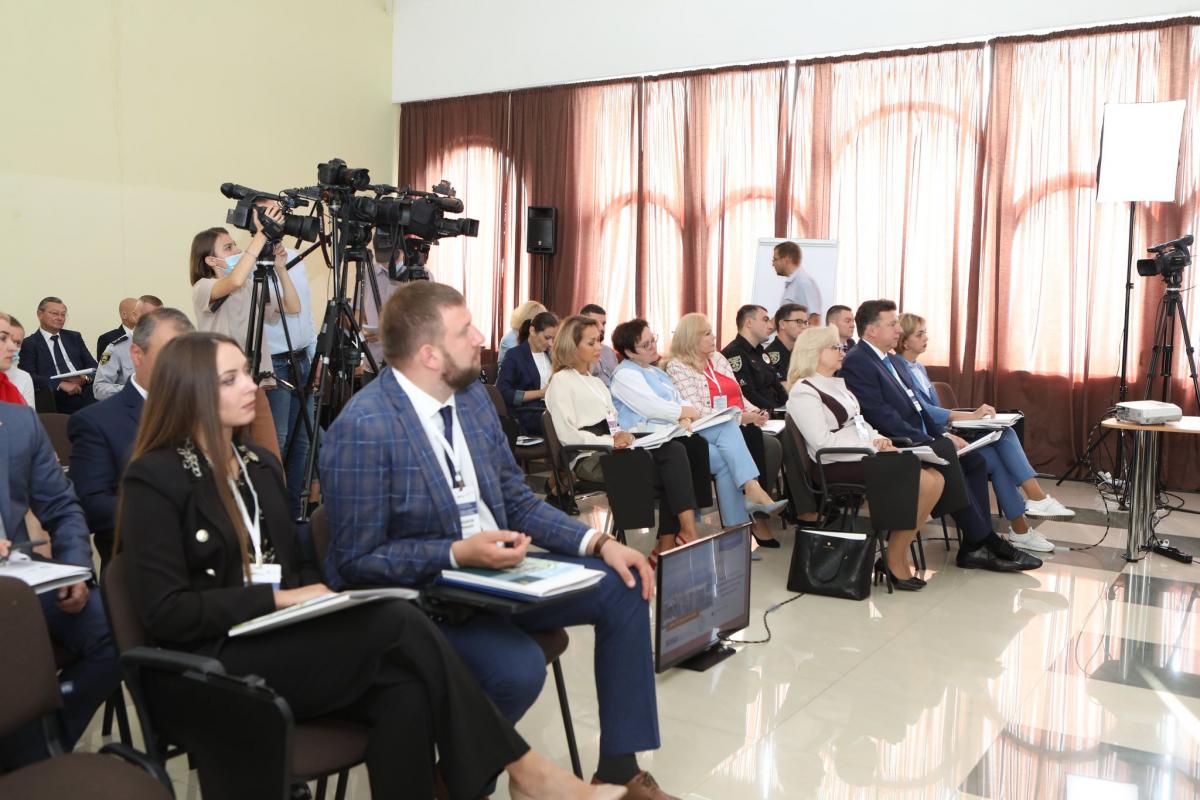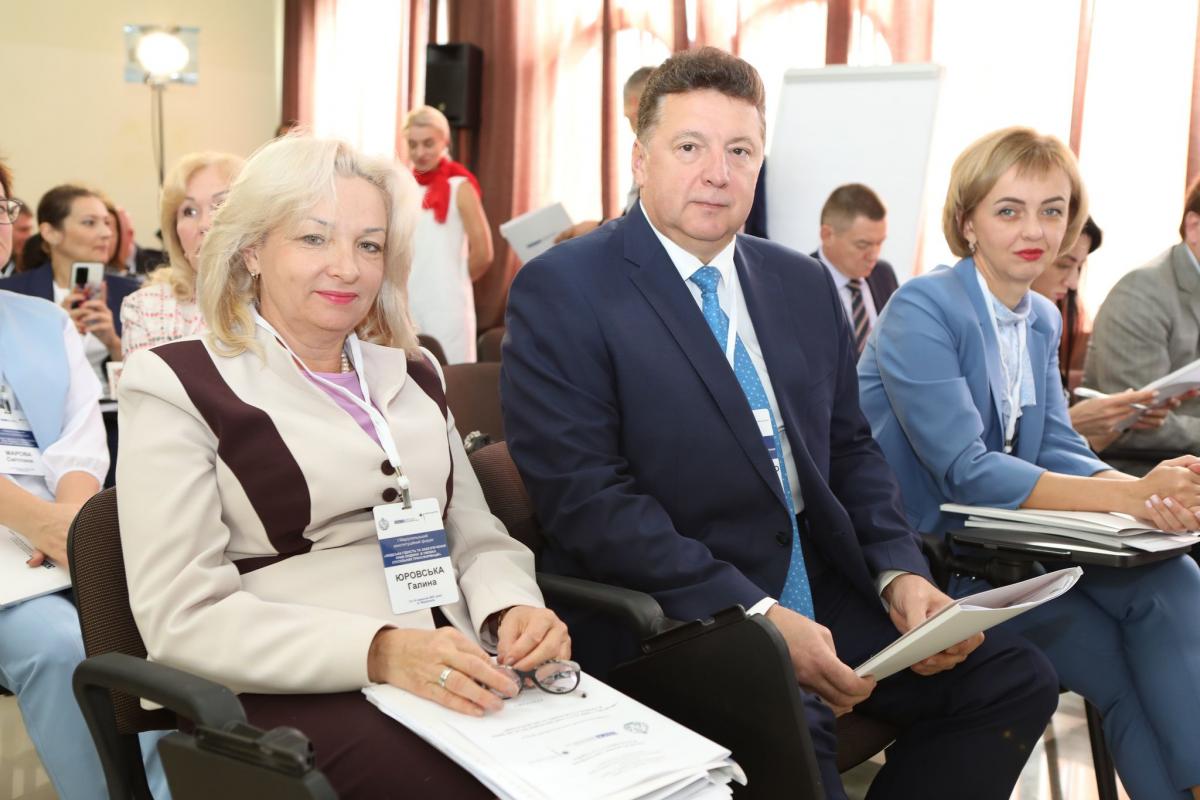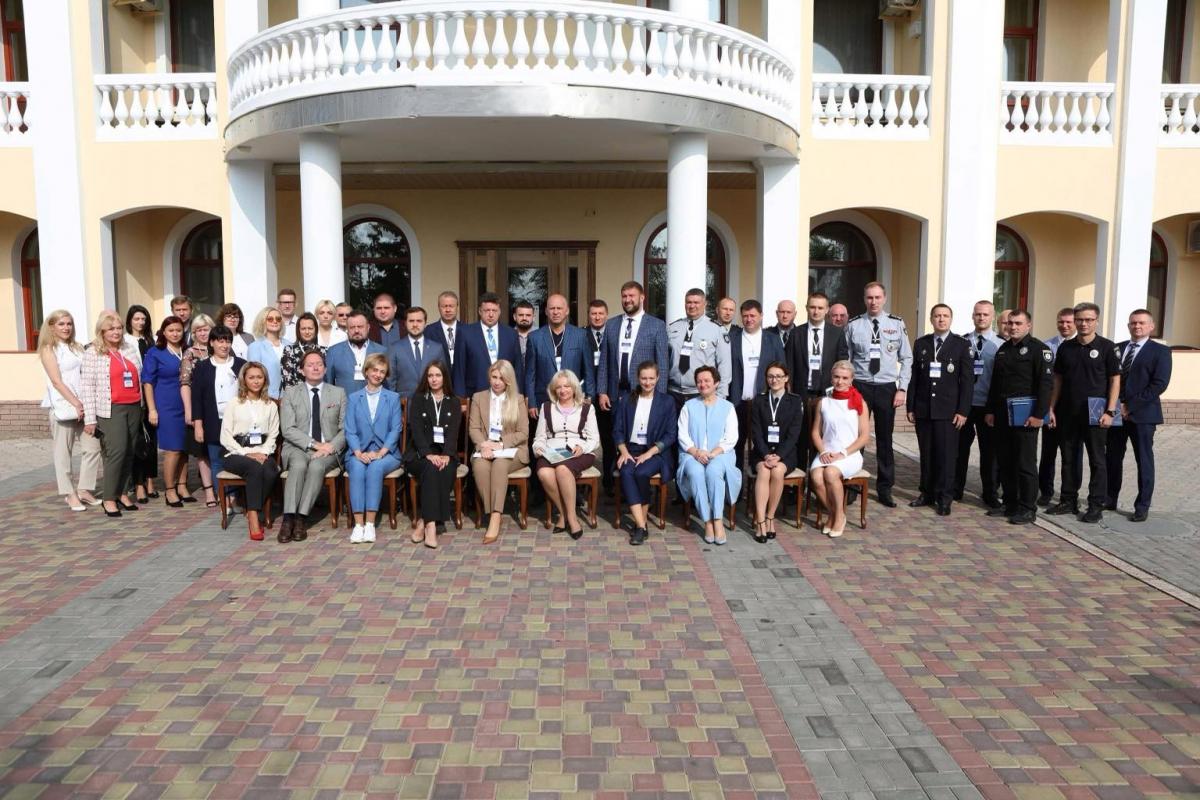Today, September 13, the I Mariupol Constitutional Forum on "Human Dignity and Ensuring Human Rights in the Social Transformation Conditions" started. The event was organized by the Constitutional Court of Ukraine together with the OSCE Project Co-ordinator in Ukraine with the support of the Donetsk Regional State Administration and the Mariupol City Council on the occasion of the 25th anniversary of the Constitutional Court of Ukraine. The forum will take place on September 13-14 in Mariupol.
The Constitutional Court of Ukraine is represented by Deputy Chairman of the Constitutional Court of Ukraine Serhiy Holovaty, CCU judges Viktor Horodovenko, Vasyl Lemak, Galyna Yurovska, as well as employees of the Secretariat of the Constitutional Court of Ukraine. The representatives of the Supreme Court, scientific community, local self-government authorities, domestic and international experts on constitutional justice also participate at the forum.
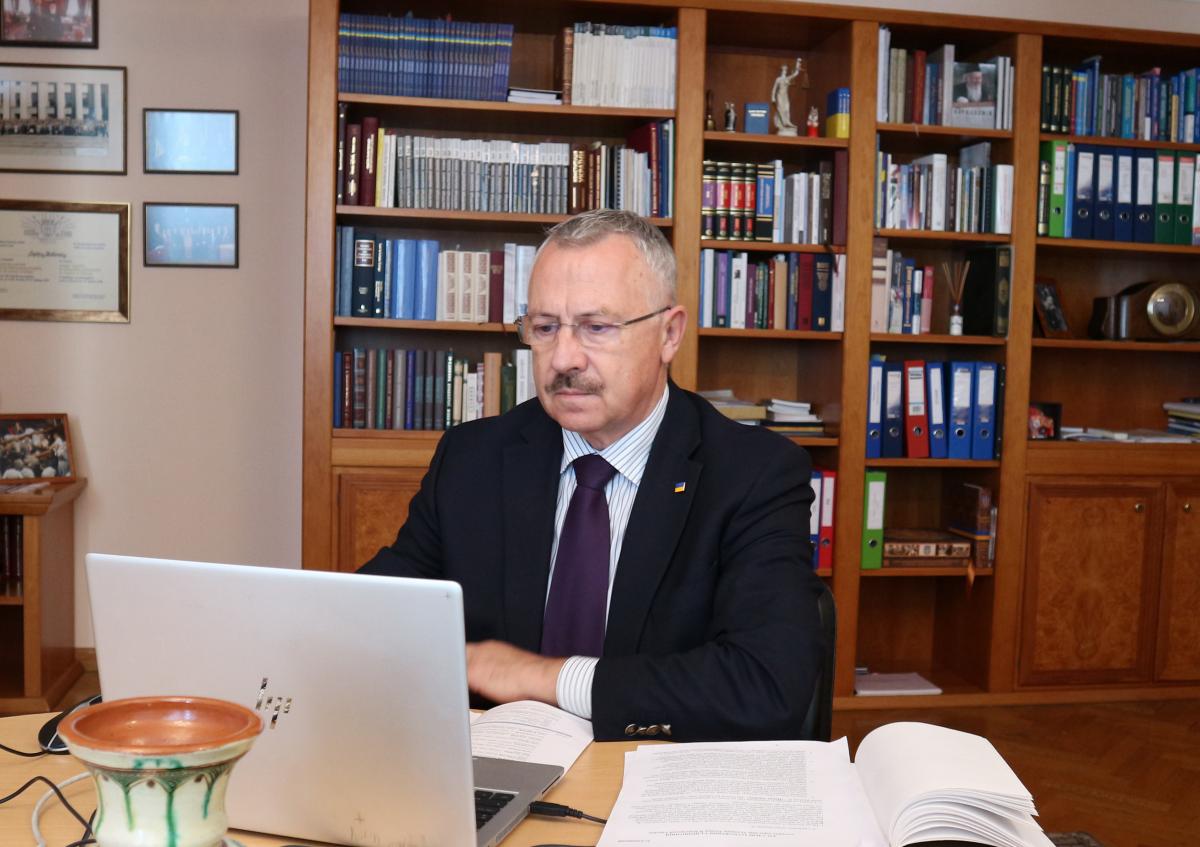 Serhiy Holovaty, Deputy Chairman of the Constitutional Court of Ukraine, addressed the participants of the international forum with a welcoming speech, emphasizing that the subject matter of discussion is extremely important and relevant.
Serhiy Holovaty, Deputy Chairman of the Constitutional Court of Ukraine, addressed the participants of the international forum with a welcoming speech, emphasizing that the subject matter of discussion is extremely important and relevant.
According to the judge, Ukraine has been undergoing social transformations since the declaration of its independence. Deputy Chairman reminded that Ukraine recently celebrated the 30th anniversary of the independence of the Ukrainian state, which has chosen the orientation of its development in the direction of Western civilization and Western values, first of all - respect for human dignity and human rights.
In his report, Serhiy Holovaty noted that today Ukraine is gradually overcoming the lack of knowledge and experience in state-building, in affirming the ideals of Western values, because, as the judge stressed, the Soviet system did not provide knowledge about human rights, liberal democracy or rule of law principle. Mr. Holovaty noted that coming into the world, human already has dignity, because it is inherent in him or her by Nature. "Human has innate rights that no one can alienate," he said.
In conclusion, the Deputy Chairman of the Constitutional Court of Ukraine wished the participants a fruitful discussion and in-depth understanding of the forum.
The OSCE Project Co-ordinator in Ukraine, Ambassador Henrik Villadsen, congratulated the Constitutional Court of Ukraine on its 25th anniversary. In his speech, he noted that the rule of law and human rights are universal principles worthy of daily conscientious struggle.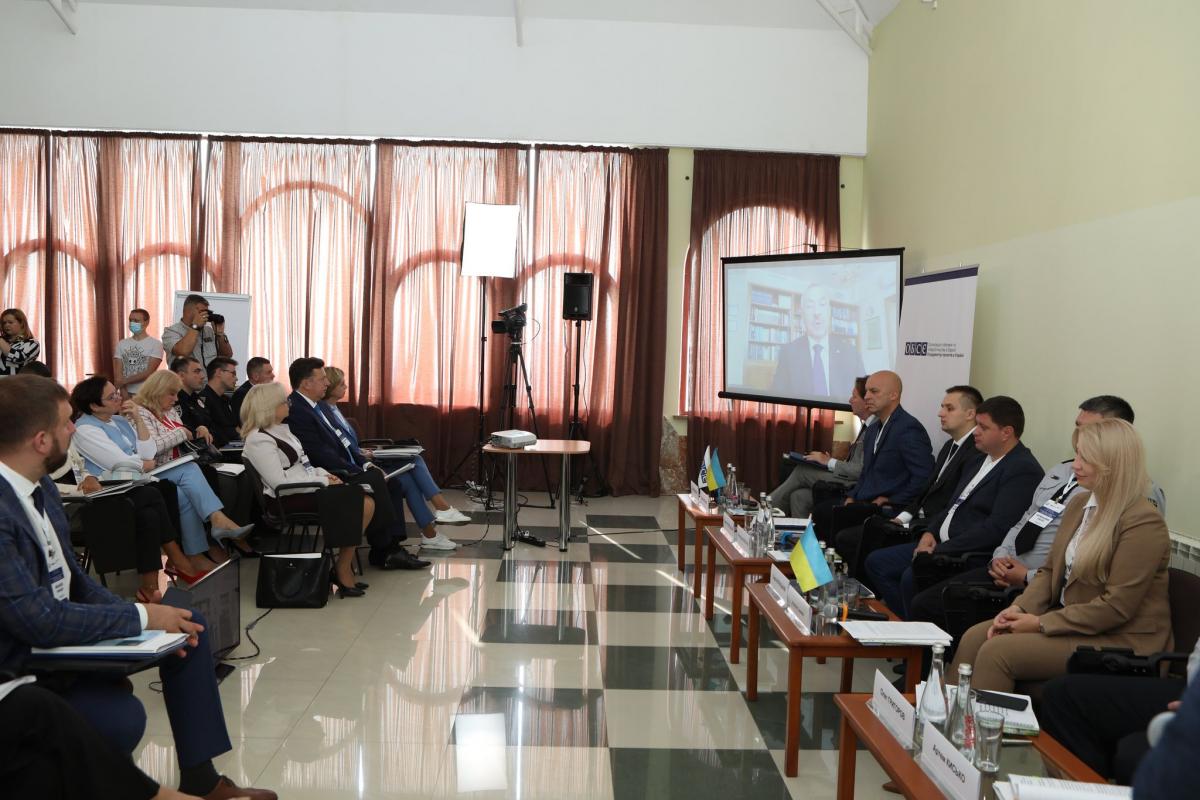
Mr. Villadsen noted that the venue of the First Constitutional Forum - the city of Mariupol - was chosen not by chance: this city is an outpost bordering the areas where the Russian-Ukrainian armed conflict is currently taking place, therefore, it is significant to hold an event aimed at strengthening the constitutional order of Ukraine and upholding the rights and freedoms of human and citizen, in this city.
The OSCE Project Co-ordinator in Ukraine also shared the view that the constitutional order is not ideal in any country in the world, but it is a time-tested form of social contract, and the strength of the social contract in Ukraine is the main goal of the OSCE in Ukraine.
The introductory speech was also made by the Deputy Head of the Donetsk Regional State Administration Vadym Filashkin and the Secretary of the Mariupol City Council Kseniia Sukhova.
The first panel "Constitutional Principle of Equality: Gender Dimension" began with a speech delivered by the judge of the Constitutional Court of Ukraine Galyna Yurovska.
The speaker focused on issues of gender equality between men and women. In her speech, the judge focused on such important principles that determine the constitutional value as equality and justice. The judge noted that the Constitution of Ukraine defines equality of citizens before the law, equality of people in their dignity and rights, as well as outlined a number of decisions of the Constitutional Court of Ukraine, in which the Court, in particular, defined equality and non-discrimination as a constitutional principle of Ukraine's national legal system.
She noted that the gender equality is not about women but about human rights, equal opportunities and means for their implementation.
Judge Yurovska pointed out that as to their content laws have to be permeated with the ideas of social justice, freedom and equality and the state has to protect the mechanisms of implementation of equal opportunities. At the same time, as regards gender equality it is not that women have to be granted the rights of men but on the contrary that men and women have to be granted possibility to freely choose their social role in the society.
"The Constitutional Court of Ukraine, based on the scientific and legal doctrine of constitutional law, the provisions of the Constitution of Ukraine and international obligations, introduces constitutional values in various spheres of public relations, promotes gender equality as part of the general principle of equality," said Galyna Yurovska.
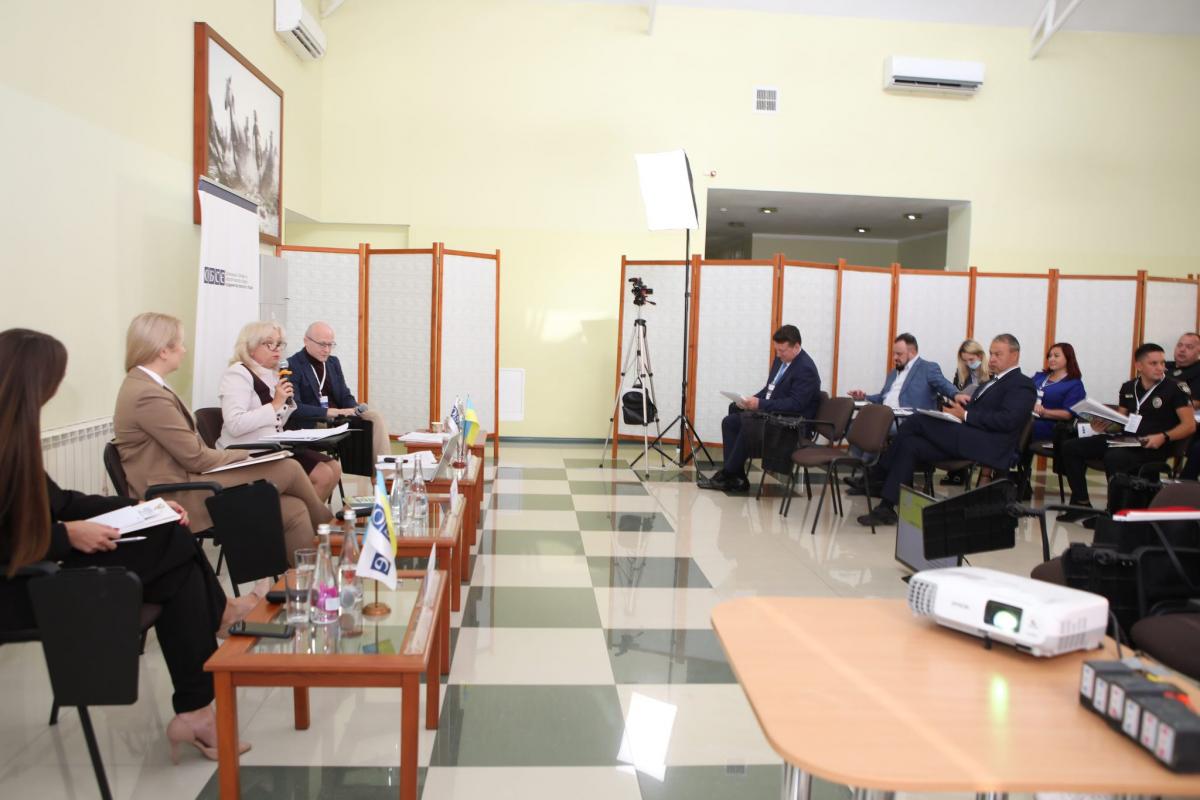 In his speech, Oleksandr Vodyannikov, National Legal Adviser to the OSCE Project Co-ordinator in Ukraine, outlined issues such as gender analysis, gender dimensions of the Constitution, equality theory, and the methodological apparatus of gender equality analysis. He cited examples of the jurisprudence of foreign constitutional bodies, which used gender analysis exclusively to address many issues, including local self-government.
In his speech, Oleksandr Vodyannikov, National Legal Adviser to the OSCE Project Co-ordinator in Ukraine, outlined issues such as gender analysis, gender dimensions of the Constitution, equality theory, and the methodological apparatus of gender equality analysis. He cited examples of the jurisprudence of foreign constitutional bodies, which used gender analysis exclusively to address many issues, including local self-government.
Reports were also made by Professor of the Department of Constitutional Law of Ivan Franko National University of Lviv, Doctor of Law, Associate Professor Olena Boryslavska, Associate Professor of the Department of Criminal Law of the Yaroslav Mudryi National Law University, Candidate of Law Olena Kharytonova, Secretary of Mariupol City Council Kseniia Sukhova and Assistant Rector for Gender Affairs at Donetsk State University of Internal Affairs Olha Svitlychna. Above speakers analyzed aspects of gender dimension, equality theory. At the same time, they talked about the legislative regulation of gender equality, areas of work on gender issues of higher education institutions, as well as gave examples of gender balance in some public authorities, etc.
The issue of protection of constitutional rights in modern conditions was discussed during the second panel of the forum.
Judge of the Constitutional Court of Ukraine, Doctor of Law, Professor, Corresponding Member of the National Academy of Legal Sciences of Ukraine Viktor Horodovenko presented a report on "Constitutional proceedings as a means of legal protection of rights and freedoms."
In his speech, the judge analyzed the legal status of the Constitutional Court of Ukraine, its place and role among public authorities. Viktor Horodovenko noted that the vast majority of constitutionalists perceive the Constitutional Court of Ukraine as an independent arbiter in the system of checks and balances, the ultimate defender of the constitutional order and its values within the national legal system. He noted that since 2016, with the amendments to the Constitution of Ukraine, the legal status of the Constitutional Court of Ukraine has changed significantly. In particular, the Court was removed from the judicial system of Ukraine and transferred to the autonomous Section XII of the Constitution of Ukraine, which was given the corresponding name "Constitutional Court of Ukraine". At the same time, the limits of its constitutional control were expanded, and the initiation of such control became possible not only by the relevant state authorities, but also on the basis of a person's constitutional complaint.
Viktor Horodovenko also analyzed the means of legal protection of human rights and freedoms, the implementation of which is carried out both in a direct form - of a constitutional complaint, and indirectly - it is a constitutional petition, appeal.
According to the judge, both forms are important for the protection of human rights and freedoms and complement each other. At the same time, the constitutional complaint is a "trigger" that inevitably enhances the effectiveness of national constitutional justice as a means of legal protection of human rights and freedoms, strengthening the constitutional level of their protection and thereby raising the level of ensuring such human rights and freedoms and their observance by the state.
Speeches were also delivered by the Chief Researcher of the Research Laboratory of Public Safety of Communities of Donetsk State University of Internal Affairs, Full Member of the National Academy of Legal Sciences of Ukraine Antonina Bobkova; Associate Professor of the Department of Advocacy of the Yaroslav Mudryi National Law University, Disciplinary Commissioner of the Association of Private Performers of Ukraine Olena Ovcharenko; Head of the Analytical and Legal Department of the Secretariat of the Supreme Court Rasim Babanly; Senior Inspector for Special Assignments of the Human Rights Department of the National Police of Ukraine Serhiy Sydorov, and Deputy Head of the Preliminary Opinions Division of the Legal Directorate of the Secretariat of the Constitutional Court of Ukraine Oleksandra Spinchevska.
The speakers focused on the problematic issues of implementation of certain provisions of national legislation in the field of human rights in criminal proceedings, as well as on important aspects of the constitutional protection of the right to entrepreneurial activity. In addition, they discussed the state of consideration of appeals of courts of general courts to the Plenum of the Supreme Court on the unconstitutionality of certain provisions of the laws of Ukraine.
The participants of the third and fourth panels of the forum discussed the state and prospects of constitutional reform in terms of decentralisation, peculiarities of decentralisation in the areas adjacent to the temporarily occupied territories and protection of the constitutional rights of residents of the territorial community (amalgamated hromada). Attention was also paid to the functioning of the institute of constitutional complaint and the legally significant consequences of the consideration of constitutional complaints by the Constitutional Court of Ukraine.
Addressing the forum participants, the Head of the Court Secretariat Viktor Beschastnyi noted the importance of the event, as it takes place as part of the celebration of the 25th anniversary of the establishment of the Constitutional Court of Ukraine.
He reminded that in September 2016, amendments to the Constitution of Ukraine came into force in terms of justice, which gave the Constitutional Court of Ukraine new powers to consider constitutional complaints, and on July 13, 2017 the Parliament adopted a new version of the Law of Ukraine "On the Constitutional Court of Ukraine". Since then, the body of constitutional control has faced new tasks in the direction of practical implementation of these provisions.
Judge of the Constitutional Court of Ukraine Vasyl Lemak presented the report "Constitutional Complaint: Three Years of Implementation Experience in Ukraine and Prospects". According to the judge of the Constitutional Court of Ukraine, the constitutional complaint allows to perceive the objective constitutional law, namely those provisions that define the catalogue of rights as real subjective human rights.
He analysed the experience of establishing the institute of constitutional complaint in Ukraine, noting that the struggle for constitutional complaint was not easy. "It was introduced in 2016, but de facto the Court began to consider constitutional complaints only in the spring of 2018," Vasyl Lemak said.
The speaker revealed the issues of the model of the constitutional complaint in Ukraine, the purpose and role of the constitutional complaint as an institute. In this context, he stressed that in our country the constitutional complaint is not only normative, it focuses exclusively on the provisions of the law. By a constitutional complaint, a person cannot appeal against the acts of the President, the Government, etc., he or she can do so only in relation to the law that was applied in the final court decision in his or her case. All mentioned, the judge emphasised, narrows the subject matter of the appeal too much.
Vasyl Lemak focused the attention of potential subjects of the right to constitutional complaint on the requirement to substantiate allegations of unconstitutionality of the law of Ukraine (its separate provisions) indicating which of the human rights guaranteed by the Constitution of Ukraine has been violated. In particular, he stressed that these may be rights that are not necessarily enshrined in the constitutional text, but having an individual interest in protection against arbitrariness, a person must justify it so that the Court agrees that this interest is worthy of protection at the highest constitutional level.
The judge of the Constitutional Court of Ukraine also spoke about the consequences of considering constitutional complaints. First, he stressed, the person overcomes the finality of the court decision and, through review mechanisms, re-initiates the process in his or her case. Secondly, his or her case will be reviewed in a new legal situation, in the absence of a norm of law that is declared unconstitutional. According to Vasyl Lemak, these two points reflect the role and significance of the constitutional complaint.
Vitaliy Zaporozhets, Head of the Division of Preliminary Examination of Constitutional Complaints of the Secretariat of the Constitutional Court of Ukraine, analysed in detail the requirements for a constitutional complaint and the subjects of the right to constitutional complaint. In his speech, he stressed that substantial understanding of the conditions for the admissibility of constitutional complaint by both the scientific community and legal practitioners will certainly contribute to a more effective use of the constitutional complaint as a national remedy for human rights protection.
At the same time, the speaker noted, it is the consideration of constitutional complaints by the Court and its decisions that will be an effective "catalyst" for the establishment of genuine public confidence in the Constitutional Court as an independent and authoritative institution.
Deputy Chairman of the Mariupol City Council on the activities of the executive bodies of the council Arkadiy Meshkov, Head of the Executive Committee, Professor of International Law of the Institute of International Relations, Taras Shevchenko National University of Kyiv, Corresponding Member of the National Academy of Legal Sciences of Ukraine Mykhaylo Buromenskyi, Expert of the Center for Political and Legal Reforms, guest lecturer at the Ukrainian Catholic University, Candidate of Law Oleksandr Marusiak, Head of the Department of General Theoretical Law and Public Law of the National University "Kyiv-Mohyla Academy", Corresponding Member of the National Academy of Legal Sciences of Ukraine Anatoliy Zayets, Head of the Department of Constitutional Law of the National Law University "Odesa Law Academy" Dmytro Terletskyi, Associate Professor of Department of Law and Law Enforcement of Khmelnytskyi Institute of Interregional Academy of Personnel Management, Chief Consultant of the Division of Legal Support of Consideration of Constitutional Complaints of the Legal Directorate of the Secretariat of the Constitutional Court of Ukraine Larysa Zhdankina, and Head of the Department of State and Legal Disciplines and Public Administration of Donetsk State University of Internal Affairs Olha Peresada also took part in the third and fourth panels of the forum.
During the final fifth panel social rights in the constitutional order of Ukraine, implementation of the fundamental constitutional right to education, application of the principle of international law, in particular Namibian exceptions in the judicial protection of the social rights in Ukraine were dealt upon.
Attention was drawn to the support of the Co-ordination Centre for Relocated Higher Educational Establishments, simplified procedure to enter universities for applicants from non-controlled territories, professional training for higher education staff, notably lawyers and law-enforcement officers, as well as guarantees to ensure social protection of human rights.
Reports were delivered by the judge of Court of Administrative Cassation Albert Yezerov, Director of Co-ordination Centre for Relocated Higher Educational Establishments Oleksandr Kulha, Head of the Chair of Constitutional Law and Human Rights of the National Academy of Internal Affairs Bohdan Kalynovskyi, Professor of the Chair of Labour, Civil and Social Ensuring Law of Donetsk State University of Internal Affairs Mykola Klemparskyi, Head of the Chair of State and Law Disciplines of Luhansk State University of Internal Affairs named after E.O.Didorenko Volodymyr Nesterovych.
In conclusion, Head of the Secretariat of the Constitutional Court of Ukraine Viktor Beschastnyi thanked the co-organisers and all the participants of the forum. He noted that the activities within the framework of the forum were fruitful and meaningful, and expressed hope that the discussion of the topical issues and ways of the resolution is timely and useful.
National Project Specialist of the OSCE Project Co-ordinator in Ukraine Natalia Romanova thanked the Constitutional Court of Ukraine, the German Government, and the participants of the event. She noted that this forum is the example of synergy of the work of all partners since it is important that it was attended by the representatives of local bodies, higher education establishments, experts and academics. According to her, the issues raised during the forum were considered in a comprehensive way and took into account the interests of all parties and the discussion provided basis for further meetings.

